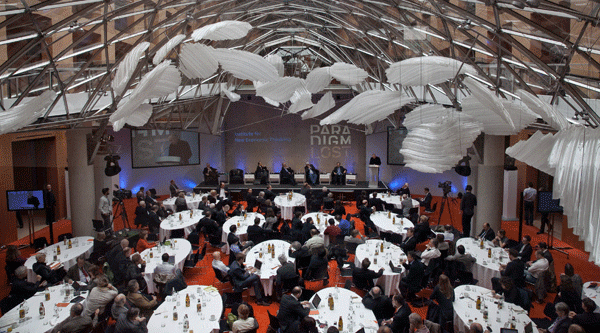Read how did the day of the Berlin conference go
The Institute for New Economic Thinking (INET) today opened its third annual plenary conference entitled “Paradigm Lost: Rethinking Economics and Politics” in Berlin with more than 300 leading global economists, policy makers, and journalists and over 300 students and young scholars in attendance. The conference is being held through April 15 at the Axica Conference Center adjacent to the world famous Brandenburg Gate.

Germany’s Federal Minister of Finance Dr. Wolfgang Schäuble endorsed the INET conference in a letter stating, “I commend the conference’s broad-based approach in pooling expertise from other fields of research and from everyday practitioners, with the aim of developing specific ideas and recommendations for policymakers.” He continued by addressing the state of the economics profession. “In my view, the fact that economists are not united by a single paradigm is not a sign of crisis,” Schäuble wrote. “Instead, this shows that pressing, relevant questions – and not an over-reliance on deterministic models – are the main force shaping the debate, and this is as it should be.”
The conference began at the German Foreign Ministry, with an initial session called “Challenging the Foundations of Economic Thinking.” The discussion featured a speech by INET Co-Founder George Soros, who explored the fallibility of orthodox economic theories, the impact of financial instability, and economists’ belief in false premises. “The idea that universal laws of economics can predict the future has to be abandoned,” Soros said. He also addressed the future of Europe and his theory of Reflexivity, which explains the circular relationships in financial markets.
Back at the Axica Center, the conference resumed with INET Executive Director Robert A. Johnson delivering a stirring lunchtime keynote address. Johnson issued a call for economics to change direction and reintegrate itself with the humanities. “Economics will be back on course…when it is sensitive to the needs of people,” Johnson said.
Johnson also spotlighted an essential part of INET’s mission by unveiling the YSI Commons, a parallel INET event where more than 300 students and young scholars have come to meet and participate in the conference via a live video stream. “INET’s purpose is to build a community that enables young economic scholars to follow their creativity,” Johnson said.
The next session, called “Which Way Forward? Reflections on Global Turmoil and the Role of Markets, Governments, and Civil Society,” featured speakers Joschka Fischer, William Janeway, Dennis Snower, Joseph Vogl, and William White. Fischer warned of the potential pitfalls of Europe’s current crisis, saying, “If the currency union will fall apart, Europe will fall apart.” He also talked about the realities of globalization and the 21st century global economy. “Globalization is not a conspiracy,” Fischer said. “It means that the vast majority of mankind are aspiring to the same quality of living.” He suggested that dealing with the consequences of this transformation is a key challenge of the 21st century.
William Janeway also spoke about climate change and innovation, saying, “The [U.S.] President called for a Sputnik moment; we are likely to need a Pearl Harbor moment…when Palm Beach is under three feet of water I have no doubt there will be a movement for climate change.” Dennis Snower advocated discarding one of the central axioms of orthodox economics, “homo economicus,” declaring that it is a factually wrong picture of human nature and that it imposes “an imaginative straightjacket that prevents us from cooperating in all the ways that we are capable of.”
Next, Joseph Vogl and William White both talked about the problems of debt and financialization. Vogl suggested that “the financialization of political structures has resulted in has mechanized political decisions becoming subordinate to market decisions. “The market has become a creditor-God,” Vogl said and then asked, “How can public goods including liquidity avoid being confiscated by the global economy?” Meanwhile, White said that “the current debt problem is primarily a private sector problem at heart.” Yet in dealing with the current financial crisis “the state has become more powerless than it’s ever been before.”
In the next session, entitled “What Can Economists Know? Rethinking the Foundations of Economic Understanding,” Gerd Gigerenzer, questioned the economic concept of human beings as rational calculating machines, pointing out that people don’t make decisions using the complex mental equations that economists’ models would suggest. “Financial equations outperform intuition only with 500 years of data,” Gigerenzer said. “So until 2500, use intuition.”
Roman Frydman concluded the discussion with an explanation of his theory known as Imperfect Knowledge Economics. Frydman’s theory explores economics from the perspective of what Keynes called “radical uncertainty,” the idea that knowledge about the future is inherently incomplete. Earlier in the day, INET also announced the establishment of a research program on Imperfect Knowledge Economics that Frydman will head.
The dinner keynote address by neuroscientist Antonio Damasio demonstrated how human emotions interact with cognition. Damasio declared that rational thought cannot be separated from emotional reaction and that emotions actually make a positive contribution to decision making. His research showed that someone who appeared to be acting in a completely rational manner in reality was behaving erratically and unpredictably and making self-defeating decisions. An expert witness to the fact that the paradigm is lost, Damasio left the rational man of economic theory in tatters.
INET encourages you to browse through the Berlin conference pages to read more about the conference and the conference Program to find the list of speakers with some of their papers and presentations linked next to their names.

